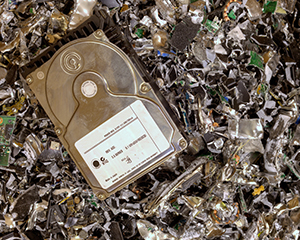Sarbanes–Oxley Act (SOX) Favors Hard Drive Recycling

Featured Image: iStock.com/hroe
Anyone involved in entrepreneurial activities must know about the Sarbanes and Oxley Act of 2002 in the USA.
Named after Senator Paul Sarbanes and Representative Michael Oxley, the Sarbanes-Oxley Act was enacted in response to the high-profile Enron and WorldCom financial scandals. It was in the best interests of the shareholders and to protect the general public from fraudulent practices in the enterprise. According to the soxlaw website, this law is mandatory for all big or small organizations to comply with.
What is Sarbanes-Oxley Act?
The act is responsible to set deadlines and publish rules on requirement. It specifies how a business should store its data and for how long. This act is revolutionary in the sense that it holds companies accountable for clients’ data handling. It also asks them to inform the public in case of a failure.
Because of the Sarbanes and Oxley act, companies now document the full path of their organizational data. This used to be a hazardous task because of the complications and chances of human error in dealing with large volume of complex data, especially, in the cases of merger, acquisition, overhaul, etc. But, now, this legislation defines exactly which record is to be saved and for how long.
SOX on Certified Data Destruction:
When it comes to storing company records, there is a huge amount of electronic data that comes under question. SOX Act has very clear instructions on that, though.
The Sarbanes-Oxley Act states a minimum time period of five years to save the complete electronic records of an organization, which includes all that was “created, sent, or received in connection with an audit or review and contain conclusions, opinions, analyses, or financial data relating to such an audit or review.”
Non-compliance to the law results in fines or imprisonment. In extreme cases, it may result in both. In order to create a cost-effective corporate records archive, companies make sure that the legislation requirements are met satisfactorily.
Sarbanes-Oxley Act and Hard Drive Disposal
For a corporate company’s financial well-being and security, data destruction is often the most suitable option that is not only cost effective but also brings peace of mind to the business owner that his crucial data won’t land in the wrong hands. Once the hard drive is professionally recycled and data properly disposed, there is no fear of losing important financial details to the wrong people.
The Sarbanes-Oxley Act guidelines favor data destruction in the form of hard drive shredding and tape shredding in order to maintain client privacy. Like all good recycling facilities, Hummingbird International provides excellent hard drive disposal facilities. If you want a sensible, environmental friendly solution, to your e-waste Disposal, then this Philadelphia based computer recycling firm is your ultimate answer.
About The Author Kelly Sampson
Kelly Sampson is a writer, blogger, and environmental enthusiast. She has strong opinions about climate change, the dogs vs. cats debate, and Oxford commas. She has lent Hummingbird International her engaging and spirited voice and turned our blog into a great place to find valuable information about e-waste, e-waste recycling, and the ITAD industry. Explore our blog to read more of her work.






